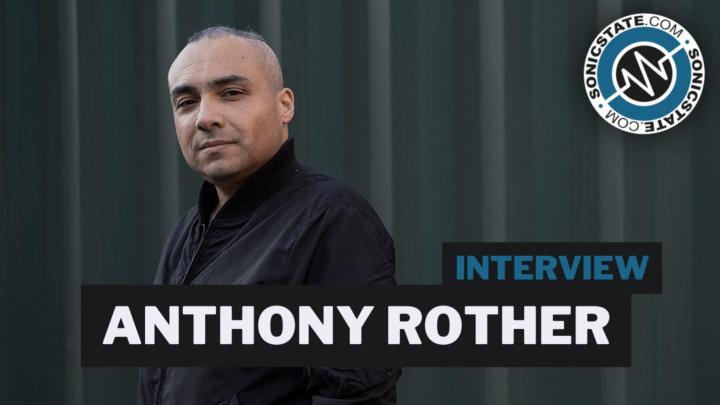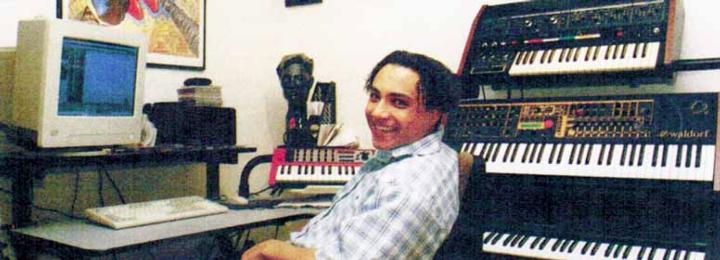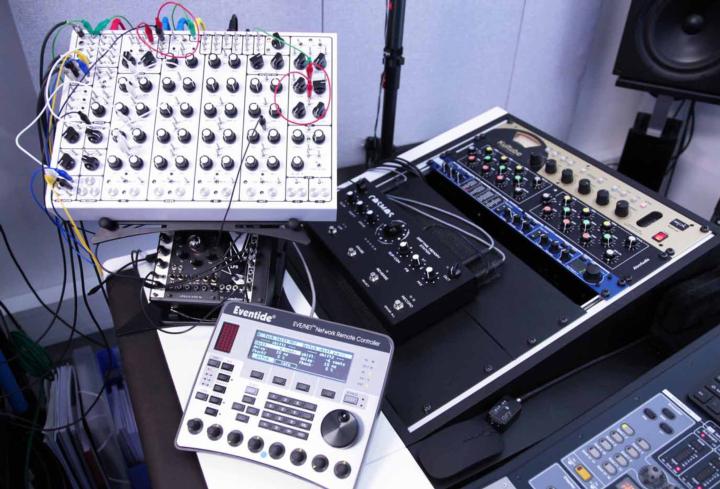Interview: Anthony Rother
On playing live, his evolving studio setup, and creative dream states 21-Sep-22

|
Anthony Rother is a name synonymous with electronic music, from releasing his debut album '$ex with the Machines' back in 1997 to an extraordinary collection of releases over more than 2 decades. He continues to push forward the electro sound, with live sets on his Youtube channel and a Bandcamp store packed with era-defining releases.
As someone who keeps out of the journalistic limelight, we jumped at the opportunity to speak with him about his creative process, his evolving studio setup, and what music currently inspires him. He has kindly provided some exclusive Waldorf Iridium kick drums, available now to all of our Patreon Supporters. Right, let's get started...
How are things in Germany at the moment? Can you tell us where you are?
I live in Offenbach which is a town next to Frankfurt, where I have my studio. It's in the famous Logic Records building, which hosted Logic Records from BMG over the years with the SNAP producer, and all their Euro dance stuff made here. Today, it's a place with many studios and all different kinds of sounds from from electro to hip hop to techno.
When did you feel the need to start making music and putting tracks out there?
It was from the beginning when I was 11 - I had the idea that I wanted to become a musician and since then I have followed this path which is driven by creativity. I'm very happy with it because I have always had the motivation to be in the studio - making music is more important to me than releasing the music and playing it to somebody in public. The creation itself is the most important aspect of me doing music.

You've said previously that you kind of daydream in the production process. Can you explain what's happening there?
I'd like to mention my debut album, 'Sex with the machines', where I experienced the creativity from getting into a daydream-like state, and by that I mean getting into the mindset of a certain space, time or situation and then writing music as, like, a soundtrack to it.
Before my debut album, I had not had an experience of getting so deep into a creative process. And since then, I've always tried to get into this creative process to discover an idea of a story - it could also be a world.. maybe it's not so easy to explain! It's like an idea you have, a scenario which becomes so real that you can feel there may be the people, places and things which happen and exist within this world.
Then I make music to describe this feeling, or I make music to describe the scenarios and the stories I find in there. It's driven by daydreaming, and this is very powerful for me creatively, because it gives a reality to my music.

Do you relate this technique in any way to a meditative or a kind of Zen state?
Yes - making music is a creative process like Zen itself. Zen is a word for somebody that could be simply sitting under a tree and meditating, but Zen is also the creativity, when I go into the flow and it gets so intense that I lose myself.
That's the nicest moment because that's Zen in creativity, and the preparation for it has been my whole life. My daily life is so structured that I can get into the Zen mode because I am taking care that I don't have any problems with, let's say, tech stuff. I'm very particular about all my business stuff, everything that can create a mental problem or distraction is sorted out in order to have this freedom that I don't have to think or worry about anything, so I get completely into this kind of daydreaming.
That's when I also have a close look at my psychological feelings - and if there's something wrong, I always try to resolve it in some way to make sure that I can be as free as possible. This is the preparation in general for being an artist and that's something I have to do every day, because you have everyday stuff which comes towards you. I have to deal with these things like a manager to make it possible for my creative soul to be free.

Can you take us back to the equipment you were using in that first album?
I made it back when it was not possible to buy cheap equipment and to do high quality recordings without a studio setup. A close family member gave me a loan so I had a small studio with a Behringer MX 8000 mixing desk, an Ensoniq ASR 10 sampler, a JD 800 from Roland, an Ensoniq DP4+ and Tascam DA 20 - that was it.
I had cheap speakers from our local electronic store and with this stuff I produced 'Sex with Machines'. During the production I bought a second hand Digidesign Session 8 hard disk recording setup from a friend of mine, so I was one of the first artists from the Kanzleramt crew that used that technology - which opened the field because most of the stuff before I had to do with the sampler.
I did the mastering for the CD with this Session 8 and it still sounds very good!I was lucky that this gear was available at this time because the only thing that was affordable and available was the Mackie 1604 because there was no way I could afford the Mackie 8 bus! The exact JD-800, Ensoniq ASR 10 and the DP4+ are still in use in my studio today.

It's great to see how your studio has changed because you do a lot of YouTube videos. and live sets from there now. You often use vocoders there, can you remember the first time you heard a vocoder?
The first time I heard the vocoder was from Kraftwerk and all the US electro that was around in the 1980s. The first vocoder I used was on 'Sex with Machines' using my DP4+ which was very hard to use but it's got a very unique sound. Then I got the MAM VF-11, an analogue vocoder made by a German who is the same designer behind the Schmitt synthesizer and the ADX1 - a drum synthesizer from the same company.
The VF-11 I used on 'Little Computer People' and some other tracks, then in 98 or 99 the Clavia Nord Modular G1 came on the market and as soon as it came out, I bought it because I saw the possibilities it had. I used it as my main vocoder, then in 2003 the Modular G2 was released and since then I'm using that - I have plenty of them... I have four of them! I have a headset connected with the mix link from Eventide and a condenser microphone I can switch on and immediately record in the moment when I need a vocoder.
That's the vocoder I'm using today and for all these years because I built my own vocoder patches using the Nord Modular environment, which is so powerful. No other vocoder can compete with the variety of sound with this one - the vocoder sounds I can create with this machine are insane!
I'm glad that you've stuck with that one and it does everything you need! You also mentioned the Little Computer People album that you put out - a really fantastic version of the theme song with some amazing artwork as well. Were you a fan of the video game?
Yes, I played this game on the cassette!.For that release, I invented a band of three little computer guys because I wanted to make an electro sound that had more pop appeal. With Anthony Rother I wanted to stay more in the darker realm of the electro so I invented this group and used this as a moniker.
When I was like 10 to 15 this was my music, my music box, the music from the games was what my friends and I listened to. This was like our local Spotify, as good as the music from a Commodore 64 was, like all the Rob Hubbard stuff - we would listen to this as regular music.

Your audience loves watching your sets and seeing how much fun you have doing them in your studio. Can you give us a bit of information about how you're sequencing things when you're playing live?
Sure, when I play live I have a MPC-X and that sequences a Nord Modular G2X, and I have an Alpha Juno 2 as a keyboard for lead sounds and strings, then I have two Micro Modulars - one for the vocoder and one for some tracks, with one of them being MIDI controlled with the second Nord Modular G2. So two Micro Modulars and a Nord Modular acting as a MIDI controller to control the Micro Modular and so I have the possibility to switch on beats - the drums, hi hats, baselines and control everything.
The second Nord Modular G2X is connected to the MPC X and gets the MIDI from there and then I'll play everything here and arrange it live. It's only MIDI loops in the MPC-X and I create it like in a jam - the mixer is a Midas 32. This is my live setup so I can rehearse before I play and if I want to change something I can do that at any time.
This setup was rebuilt in 2015 because Dave Clark invited me to play at an electro event and he wanted me to play a hybrid set but I thought I was gonna play live electro - so I rebuilt my live set and reprogrammed all the sounds for it. I don't use any samples - it's fully synthetic with a very characteristic sound, which created a nice challenge for me. I used Cubase XT to load my old tracks and export the MIDI files, and recreated all my JD800 sounds on the Nord Modular.
The Alpha Juno 2 is not something I've noticed in your setup before, it's incredibly diverse, isn't it?
It's an incredible synthesizer. I have two of them - one for live and one in my studio with the programmer. And at the moment I don't use it too much but in the past I used it on every track. It has so many great presets - you can start from the preset and create such great sounds. These presets are like classics - we have the Hoover that became the techno sound to the basslines, the strings, and the leads.

You recently did some sounds for the Waldorf M synthesizer, too..
Yes, this was my first work as a professional sound designer! I got involved as a beta tester for the M, and that led to being invited to program some sounds. In the end, I made so many sounds, it became a full bank! At the moment, I'm doing a sound bank for the Iridium keyboard, which is nearly finished.
What sort of music is inspiring you at the moment - perhaps in the new generation of artists? What are you listening to?
I am listening to a lot of the electro stuff from the different electro shows available on the internet, like Bass Agenda, Dave Clarke's White Noise, HÖR Berlin, and Dark Science Electro! And then there's John Selway who has a show called electro Saturdays on Lab343 - with some tips and tricks in there.
I'm watching a lot of stuff from other artists on YouTube or Facebook. I'm interested in what's going on but I'm working in the studio most of the time, where I have a mental bubble that I create for myself to be creative. I'm interested in what's going on with electro and what's going on outside, to see how it's developing and what's happening.
What inspires me is still there, like the masters of my youth like Kraftwerk, John Carpenter, and the soundtracks from Jerry Goldsmith. This is a melange of things, that, that, that that are naturally part of me. So, I think there's always a bit from them in my music, of course, but I think for myself - I'm trying to be myself as much as I can be, inspired by these masters.

Electro has stood the test of time - it's always been there, integral to the underground scene. There's such a connection between reality and electro music, isn't there?
Yes, I think Electro has much to offer these days - it has come a long way. It still has something to offer, and a kind of freshness because it never went into a commercial situation that broke its neck. Even when it was receiving mainstream attention in the 80s for the breakdance time when all the big US stars like Egyptian Lover, Newcleus, Afrika Bambaataa and the Soul Sonic Force (just to name some of the big names) it still had a kind of class.
There are also so many young people and artists that are making electro and we have many electro DJs so we have a broad range now. I remember at the end of the 90s when there weren't so many electro DJs or productions or possibilities from promoters/events to present electro. These days I have the feeling it's a bit different. There are many promoters and events that are into it and they like to present an alternative to people - they like to get it out to the people. It's just it's not the mass market but it's a big portion of clubs and events.
And I think that's very important because the electro scene is like an experiment - and it's not something that's grown. It's something that makes a new way and it's something like a newcomer, even if it's old - it's a newcomer sound and it has to offer something for artists and for the audience.
It's nice when events and promoters take the risk, or invest something in to develop this kind of music. For me. It's like life. It's like a life energy. And I'm very happy that there are promoters, events, and shows around that.which give this thing a reality.

Huge thanks to Anthony for taking the time to speak to us! He's working on a new 20 track double album which will be released in December, which will be complete with its own backstory. Listen to, stream and download his music on Bandcamp. YouTube, Facebook and Instagram pages.
More information on his website: anthony-rother.com
Anthony has kindly provided some superb Waldorf Iridium kick drums, which are available to all of our Patreon supporters. Find out more and sign up here.
About the author [midierror]: midierror makes nifty Max For Live devices, innovative music hardware, award winning sample packs and hosts a podcast speaking to people in the music world.
More News: Like This- Plug-In Filter Modulates In Multiple Dimensions 19-Apr-24
- When Musicians Have Meltdowns 18-Apr-24
- Whats The Most Revered Audiophile Track of All Time? 18-Apr-24
- Jeff And His Historic Music Store 17-Apr-24
- SnapBeat Sampler Now Shipping 17-Apr-24
Even more news...
